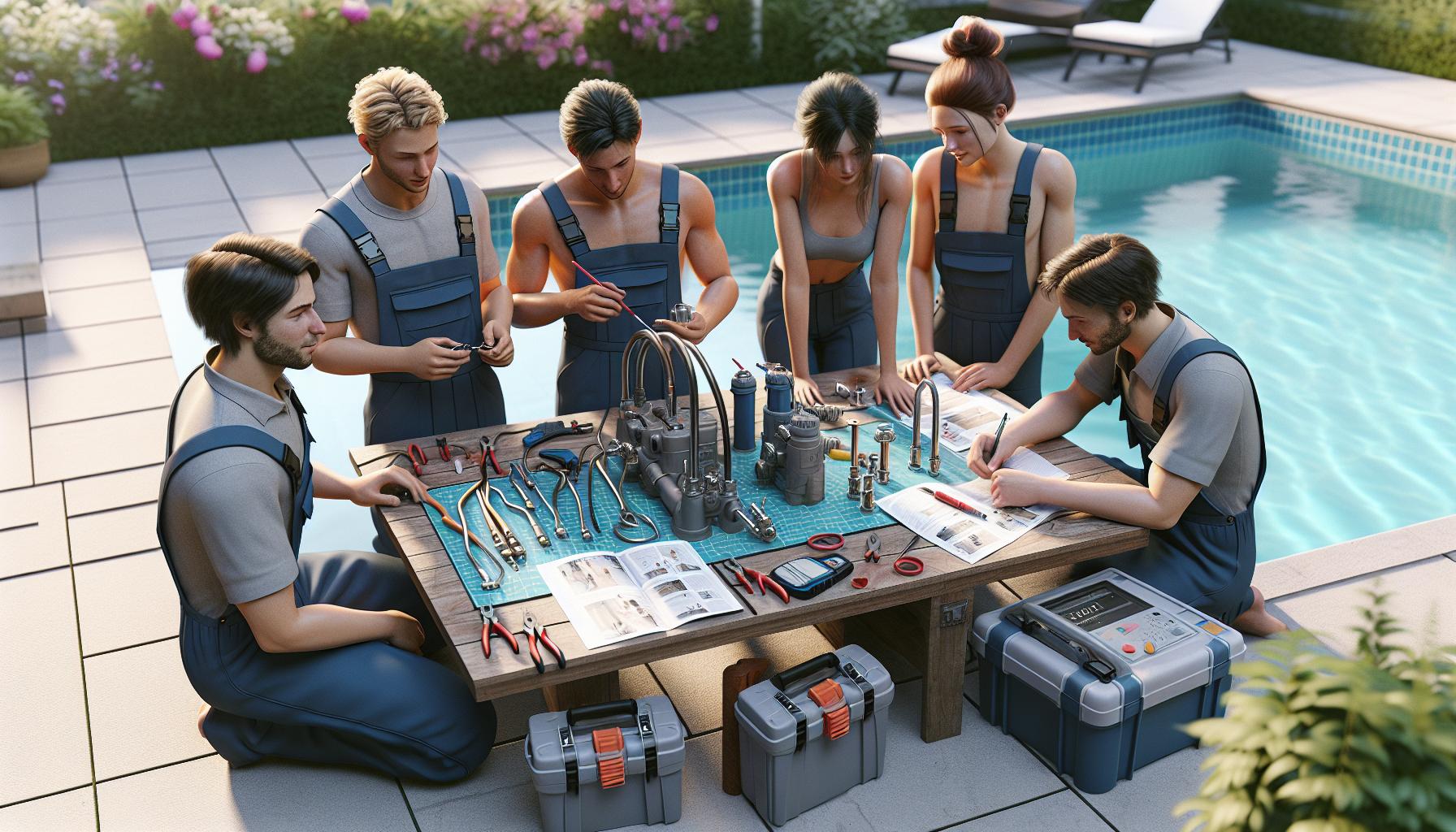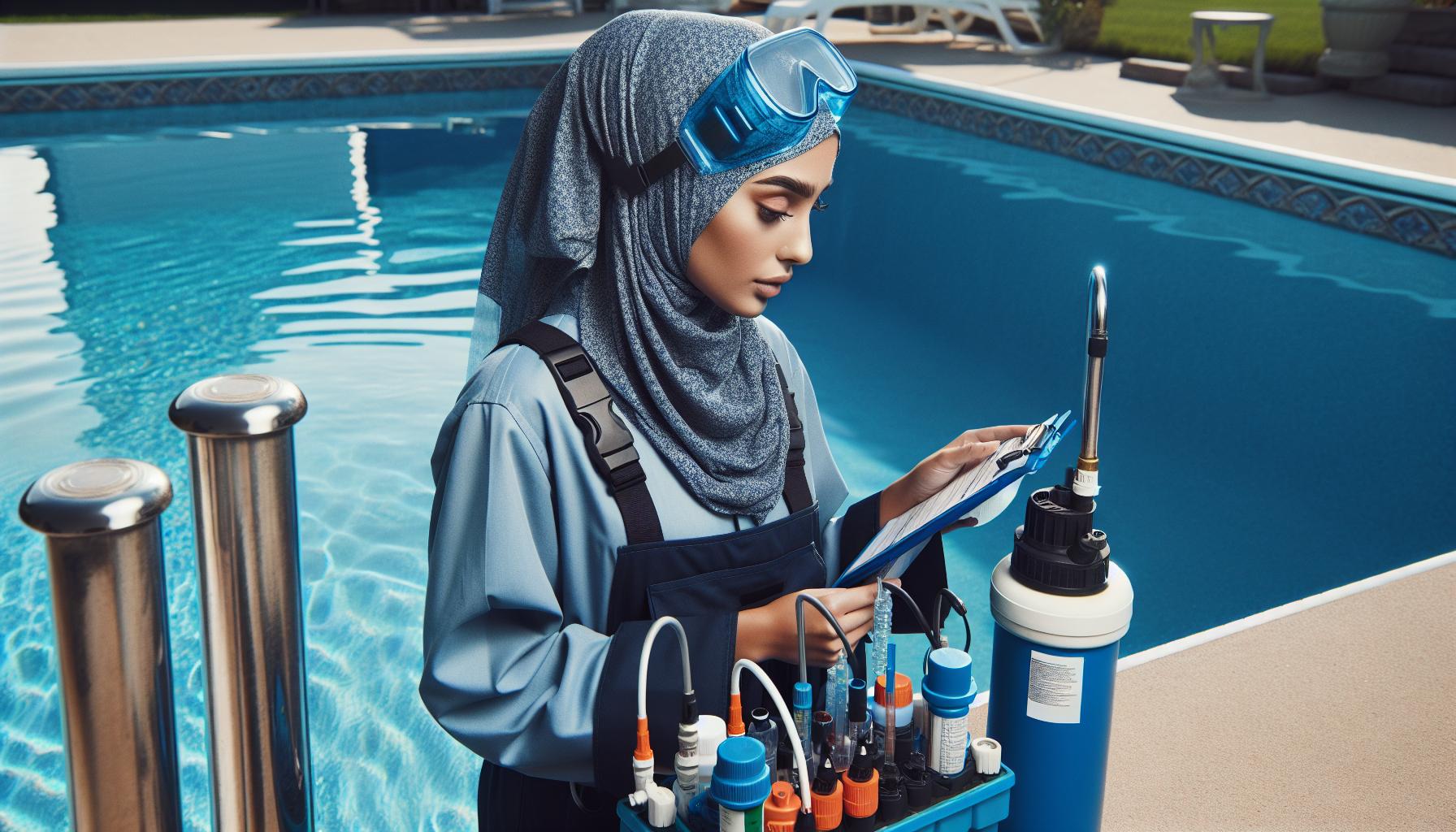Key Takeaways
- Growing Demand: The pool technician industry is projected to grow by 10% over the next decade, highlighting the increasing need for qualified professionals.
- Importance of Certifications: Certifications are essential for establishing credibility, showcasing expertise, and signaling trust to clients, making them a key differentiator in the market.
- Training Flexibility: Various training programs, both online and in-person, are available to suit different learning preferences, helping technicians master vital skills needed for effective pool maintenance.
- Key Skills Development: Technicians should focus on critical skills such as water chemistry, equipment maintenance, and safety protocols to provide exceptional service and enhance customer satisfaction.
- Adhering to Industry Benchmarks: Meeting industry standards and performance metrics not only increases accountability but also strengthens client relationships and builds trust.
- Career Advancement: Specializing in areas like water chemistry or automation and networking within the industry can open up new opportunities for career growth and professional development.
In today's competitive market, the demand for skilled pool technicians is skyrocketing, with the industry projected to grow by 10% over the next decade. As homeowners seek to maintain their pools in pristine condition, it's crucial for technicians to stand out through certifications and specialized training.
We’re diving into the essential qualifications that not only enhance a technician's expertise but also boost their credibility among clients. From understanding water chemistry to mastering equipment maintenance, the right training programs and certifications can make all the difference. Join us as we explore the benchmarks that define a qualified pool technician and how they can elevate their careers in this thriving field.
Certifications for Pool Technicians
Certifications play a crucial role in establishing a pool technician's credibility and professionalism. They demonstrate a technician's commitment to quality service and expertise in the field.
Importance of Certification
Certification signals competence and enhances trust with clients. Clients are more likely to choose a certified technician over a non-certified one when maintaining their pools. Certifications signify that we have mastered essential skills like water chemistry, equipment maintenance, and safety protocols. In today's competitive market, a certification can be a significant differentiator, helping us stand out among other technicians. Moreover, obtaining these credentials often comes with ongoing education, which helps us stay updated on industry standards and emerging technologies.
Recognized Certification Programs
Several recognized certification programs serve as benchmarks for pool technicians.
- National Association of Landscape Professionals (NALP): Offers a Certified Pool/Spa Operator certificate, focusing on safe water management practices.
- Pool and Hot Tub Alliance (PHTA): Provides various certifications, including those for service and installation, which underline comprehensive training.
- Aquatic Exercise Association: Provides certifications relevant for those looking to maintain health and wellness pools, a niche section of the market.
Enrolling in these programs can enhance our skills, improve service delivery, and open up new job opportunities. These certifications often integrate modern tools like technician scheduling software and service dispatch software, making our day-to-day operations smoother. By participating in these programs, we position ourselves as knowledgeable professionals in a growing industry, which fosters trust and strengthens client relationships.
Training Programs Available

Training programs for pool technicians provide essential knowledge and skills, helping technologists excel in a competitive job market. Several options exist, catering to different learning preferences.
Online vs. In-Person Training
We can choose between online and in-person training based on convenience and personal learning styles. Online courses offer flexibility, allowing us to study at our own pace, while in-person classes foster real-time interactions and hands-on practice. For example, engaging with peers during physical training makes learning dynamic and memorable. Institutions like Responsible Training and the Aquatic Training Institute often provide both formats for varying demands. Opting for a hybrid approach may enhance our understanding and skill application in real-world scenarios.
Key Skills Developed in Training
Training programs focus on vital skills that shape effective pool technicians. Participants gain knowledge about pool chemistry, essential for maintaining water quality. Participants learn equipment maintenance, enhancing the longevity of filtration systems and pumps. Safety protocols, crucial for protecting both clients and technicians, also form a significant part of the curriculum. Moreover, proficiency in field service management software allows us to manage schedules effectively, optimize technician routes, and enhance customer engagement. By mastering these skills, we position ourselves as trusted experts in the industry. Do we feel equipped and ready to tackle the challenges our clients face?
Industry Benchmarks

We recognize that industry benchmarks highlight what sets a qualified pool technician apart. Standards for pool maintenance dictate the requirements and expectations for service quality and reliability. Technicians should focus on water chemistry, equipment upkeep, and safety protocols. Adhering to these standards not only increases accountability but builds better relationships with clients. Establishing consistent procedures and maintaining up-to-date practices in pool care equips technicians to provide exceptional service.
Standards for Pool Maintenance
Standards for pool maintenance involve essential practices that guarantee safety, hygiene, and efficiency. Technicians must regularly conduct water tests and adjust chemical levels. They also need to inspect and maintain equipment like pumps and filters. Familiarity with applicable regulations, like those suggested by the Pool and Hot Tub Alliance (PHTA), keeps technicians compliant and enhances client trust. Moreover, utilizing automated field service solutions can streamline maintenance schedules, making operations more efficient. With the right tools, technicians can optimize routes and manage service requests effectively.
Performance Metrics for Technicians
Performance metrics for technicians provide insight into their effectiveness and efficiency. Key indicators include customer satisfaction, response times, and completion rates. Tracking these metrics helps gauge a technician's performance and pinpoint areas for improvement. Incorporating service business software allows for better monitoring of these metrics. Managerial oversight tied to technician scheduling tools aids in optimizing field operations. Technicians can engage more effectively with clients through mobile workforce management solutions, ensuring timely updates and communications. With these strategies in place, we foster a community of skilled professionals committed to excellence in pool service.
Career Advancement Opportunities

Career advancement for pool technicians goes beyond completing certifications. It includes specializations and professional interactions that elevate our skills and reputation in the field.
Specializations within Pool Technology
Specializing can significantly enhance our expertise and marketability. We can focus on areas such as:
- Water Chemistry Management: Mastering water balance and chemical treatments enhances our service quality.
- Automated Systems: Understanding pool automation technologies helps us streamline maintenance, making us more efficient.
- Safety Standards: Proficiency in safety regulations positions us as reliable professionals in our clients' eyes.
Specialization allows us to stand out and tackle complex issues with confidence. Technicians can also utilize field service management software to optimize tasks. These tools manage technician schedules, improving response times and customer satisfaction.
Networking and Professional Development
Networking opens doors to opportunities that propel us forward. We can connect with industry peers, attend workshops, and join local associations. Engaging with others leads to shared knowledge and collaboration.
We can explore platforms like:
- Professional Associations: Organizations such as PHTA host events that foster community outreach and learning.
- Workshops: These events provide hands-on experience and insights into industry trends.
- Online Forums: Participating in discussions helps us learn and grow collectively.
Building a network enriches our understanding of service business software. This allows us to integrate tools such as technician scheduling tools, enhancing our operational efficiency.
Through interactions and shared experiences, we strengthen our community. Together, we tackle challenges, celebrate successes, and elevate the standards of pool service professionals.
Conclusion
As we navigate the evolving landscape of the pool service industry it's clear that investing in certifications and training programs is essential for success. Embracing these opportunities not only enhances our skills but also builds the trust of our clients.
By adhering to industry benchmarks and focusing on performance metrics we can elevate our service quality and establish ourselves as leaders in the field. Specializations and networking further enrich our careers and strengthen our professional community.
In this competitive market our commitment to continuous learning and excellence will set us apart and ensure we meet the growing demands of our clients effectively. Let's embrace these pathways to success and thrive together in our pool technician journeys.
Frequently Asked Questions
What is the job outlook for pool technicians?
The demand for skilled pool technicians is expected to grow by 10% over the next decade. This growth is driven by an increasing need for professional maintenance and service in the pool industry.
Why are certifications important for pool technicians?
Certifications are crucial as they signal competence and professionalism, enhancing client trust. Clients are more likely to choose certified technicians, which can lead to increased opportunities and job security in the industry.
What qualifications do I need to become a pool technician?
Essential qualifications include knowledge of water chemistry, equipment maintenance, and safety protocols. Specialized training and certifications also play a significant role in building a successful career as a pool technician.
What training options are available for aspiring pool technicians?
Aspiring technicians can choose between online and in-person training programs. Institutions like Responsible Training and the Aquatic Training Institute offer courses that cover essential skills needed for effective pool maintenance.
What key skills do pool technicians develop during training?
Training programs focus on pool chemistry, equipment maintenance, safety protocols, and proficiency in service management software. Mastering these skills is vital for delivering quality service and engaging with clients effectively.
How do industry benchmarks affect pool technicians?
Industry benchmarks set standards for maintenance quality, including water chemistry and equipment upkeep. Adhering to these standards enhances service quality and builds client trust in technicians' expertise.
What performance metrics should pool technicians track?
Technicians should monitor customer satisfaction, response times, and completion rates. These key indicators help evaluate effectiveness and pinpoint areas for improvement in their services.
How can pool technicians advance their careers?
Career advancement can be achieved through further specialization, obtaining additional certifications, and networking. Joining professional associations and attending workshops fosters collaboration and shared knowledge within the industry.






